US Expresses 'Disappointment' At Failure Of Iran Talks In Doha
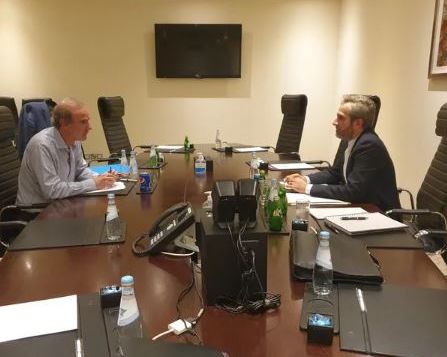
The United States expressed disappointment that a two-day round of indirect talks with Iran brokered by the European Union ended without progress on Wednesday.

The United States expressed disappointment that a two-day round of indirect talks with Iran brokered by the European Union ended without progress on Wednesday.
A State Department spokesperson said, "While we are very grateful to the EU for its efforts, we are disappointed that Iran has, yet again, failed to respond positively to the EU's initiative and therefore no progress was made," adding that “Iran raised issues wholly unrelated to JCPOA and apparently isn't ready to make fundamental decision on whether it wants to revive JCPOA or bury it.”
The spokesperson said that "in Doha, as before, we made clear our readiness to quickly conclude and implement a deal on mutual return to full compliance with the JCPOA based on almost a year and a half of negotiations."
A senior administration official also said Wednesday that the talks were left in a stagnant spot, "which at this point means backwards."
Following months of standstill after numerous rounds of talks in Vienna since April 2021, Iran agreed to new talks with the US following a recent visit to Tehran by EU foreign policy chief Josep Borrell.
EU's envoy Enrique Mora also confirmed that the indirect talks between Tehran and Washington in Qatar ended without progress.
It is not clear how the Biden administration deal with the failure to reach an agreement with Tehran, as its nuclear program continues to expand.
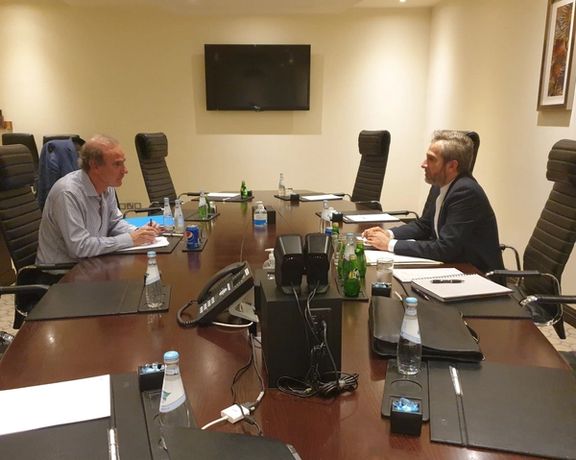
Indirect talks between Tehran and Washington in Qatar to resolve remaining issues in negotiations to restore the landmark 2015 nuclear pact ended without progress.
Calling the proximity talks “two intense days” of negotiations, EU's envoy Enrique Mora tweeted Wednesday evening that “Unfortunately, not yet the progress the EU team as coordinator had hoped-for. We will keep working with even greater urgency to bring back on track a key deal for non-proliferation and regional stability.”
It is not clear whether there might be a further round, while Tehran and Washington have yet to comment on how the talks have progressed, or what they expect next.
Moreover, Axios quoted an unnamed US official as saying that "The Iranians have not demonstrated any sense of urgency, raised old issues that have been settled for months, and even raised new issues that are unrelated to the 2015 nuclear agreement.”
According to the source, “A deal has been available for some time. If there is a side that needs to take a decision, it’s them — and it’s been them for months."
Earlier in the day, Tasnim news agency, with links to the Revolutionary Guards, reported that the Tehran-Washington nuclear talks in Qatar had ended without agreement, a claim quickly rebutted by the foreign ministry.
Tasnim said the American side refused to give "guarantees for Iran's economic benefits” from the deal.
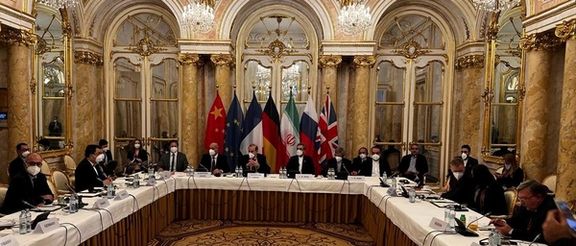
Revised version- Iran’s foreign ministry quickly rebutted a report Wednesday that Tehran-Washington nuclear talks in Qatar had ended without agreement.
The official news agency IRNA also weighed in, saying meetings were continuing and would end as planned today. It criticized un-named media for suggesting the negotiations had failed.
The talks at the Intercontinental hotel, Doha, were announced at the weekend and had been expected to last two to three days. It not clear whether there might be a further round. Tehran and Washington have yet to comment on how the talks have progressed, or what they expect next.
The meetings in Qatar have been coordinated by Enrique Mora, the senior European Union official who chaired the Vienna talks between Iran and six world powers aimed at restoring the 2015 Iran nuclear deal, which paused without agreement in March.
Mora has acted in Doha as a go-between in what EU foreign policy chief Josep Borrell dubbed ‘proximity talks,’ a format required by Iran’s refusal to talk face-to-face. Mora met Tuesday with Ali Bagheri-Kani, the deputy foreign minister leading the Iranian team, and separately with Robert Malley, the White House special envoy for Iran.
Tasnim’s account
In citing an “informed source” that the talks had failed, Tasnim, which is affiliated to Iran’s Revolutionary Guards, blamed US intransigence. “What prevented the talks reaching a positive result” was the US failure to offer “assurances over Iran’s economic benefits from a deal,” which for Iran were “red lines.”
Tasnim said US negotiators had insisted on a draft American text presented in the seventh round of discussions – back in December 2021 – in the year-long Vienna talks.
The agency’s report made no reference to the US listing of the Revolutionary Guards (IRGC) as a ‘foreign terrorist organization.’ Tehran’s demand for revoking the listing, made by President Donald Trump in 2019, was reportedly a central, unresolved issue in the stalling of the Vienna talks.
Attempts in the Vienna process to revive the 2015 deal (the JCPOA, Joint Comprehensive Plan of Action) struggled to agree on which US sanctions introduced since Washington left the nuclear agreement in 2018 violate the JCPOA, which offered Iran access to world markets without “discriminatory regulatory and procedural requirements in lieu of the sanctions.”
Tasnim criticized US President Joe Biden for “weakness and inability to make the decision that a restored JCPOA needs only US acceptance of Iran’s red lines over economic benefits.” The agency claimed Mora had criticized the US over the stance it was taking.
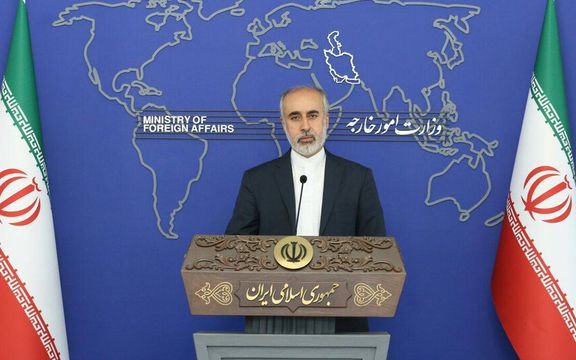
As indirect nuclear talks were taking place between Tehran and Washington on Tuesday, Pundits in Iran sounded a bit more optimistic about a nuclear deal.
The optimism was reflected in the foreign exchange market with the rial gaining some of its lost ground, trading at 307,000 to the dollar, up from 320,000 just days earlier.
In a commentary Tuesday in reformist Shargh newspaper entitled “Good Agreement-Bad Agreement”, former diplomat Javid Ghorbanoghli pointed out that Iran has realized the value of restoring the deal, officially referred to as the Joint Comprehensive Plan of Action (JCPOA). It would be the least costly solution to the current dire economic situation in the country and the mounting criticism of the government for failing to address the problems, he added.
Ghorbanoghli said President Ebrahim Raisi must explain what concessions he has managed to get from the opposite side in the talks in comparison with his predecessor Hassan Rouhani to be able to call his deal a “good agreement” as opposed to a “bad agreement”.
The biggest reward to be given to Iran for agreeing to a deal is probably allowing it to reenter the global oil market and access the proceeds of oil exports, Yousef Molaei, former professor of international relations at Tehran University, who has always insisted that the restoration of the JCPOA is inevitable, wrote in a commentary entitled “Rays of Hope Becoming Brighter” in reformist Arman-e Melli newspaper Tuesday.
Molaei argued that Europeans who want to avoid buying oil from Russia convinced Americans on the one hand, and Iranians on the other, to return to the talks and finalize an agreement.
In an interview with Arman-e Melli Tuesday, Sabbah Zanganeh, international relations expert, expressed hope about restoration of the JCPOA and stressed the role of the energy crisis in the decision of the United States and European powers to restore the nuclear deal with Iran. He also said Saudi Arabia which opposed the deal has concluded that it can no longer try to delay it. Russia could also benefit from the deal because of its role in Iran’s nuclear projects and construction of its nuclear power plants.
The reformist Etemad newspaper, however, warned that restoration of the JCPOA could only serve as a temporary solution to problems and quickly become ineffective if a new strategy is not drawn to solve the fundamental problems that the Iranian society is currently facing.
Influential political factions that have always staunchly opposed a nuclear deal may try to prove that there will be no positive changes, and everything will continue as before. In order to show their power they may resort to taking actions in foreign arenas that shift tensions from the nuclear issue to other matters, Etemad wrote in its unattributed commentary Tuesday.
The commentary added that the same forces may increase cultural and social pressure on ordinary people to cause disillusionment with the restoration of the deal or the government may give up economic reforms and resort to handing out money to people to overcome their dissatisfaction and buy their support.
Iranian officials and hardline media such as the IRGC-linked Javan newspaper, however, have been underlining that the Qatari-brokered talks still did not involve direct negotiations with the American side.

Iran's Reform Front has urged President Ebrahim Raisi to reach a nuclear deal and embrace reforms to avert serious harm to the country before it is too late.
The Reform Front, an umbrella organization formed by several Iranian reformist parties, told Raisi that Iran's negligible economic growth rate and high inflation coupled with wrong economic and foreign policies have created the current crisis in the country.
The letter as published by Aftab News in Tehran, has been also sent to Parliament Speaker Mohammad Bagher Ghalibaf. In the letter, the Reform Front has accused the Raisi administration and the parliament (Majles) of failing to recognize the country's problems, determining priorities, and choosing the right solutions.
Iran’s reform movement is led by politicians and public figures loyal to the principle of having an Islamic government but are opposed to some of the radical policies of hardliners who follow Supreme Leader Ali Khamenei. A reformist president, Mohammad Khatami, was elected in 1997 and served two terms until 2005, but hardliners gradually disarmed the reform movement and by 2020 pushed them completely out of power and even public service.
The Reform Front also warned that time is running out for addressing widespread dissent that seriously threatens Iran's security. The front also advised Raisi to work hard to improve per capita income and restore the people's purchasing power amid rising inflation and the constant devaluation of the national currency.
The letter added that despite government slogans of self-sufficiency, people's livelihood is tied to the fate of the 2015 nuclear agreement, the JCPOA. In the meantime, the government needs to reduce its irrelevant expenses by taking measures including cutting the budget of parallel institutions that duplicate the efforts of other organizations.
Meanwhile, the Reform Front charged that many of the measures the government pretends to be taking to solve the economic crisis, including increasing prices for essential commodities, are in fact initiatives that are solely meant to make up for its budget deficit, and are not serious efforts for structural change.
The Reform Front then offered six solutions for the country's economic problems. The first is reviving JCPOA and lifting of sanctions. This, said the letter, is the government's most important responsibility. The front advised Raisi "To seek the necessary permissions [from Supreme Leader Ali Khamenei] and take quick brave measures to have this done in order to serve the country's national interests."
The letter also urged “détente” in foreign policy based on national interests and reconstituting Iran’s international banking ties, currently sanctioned by the United States, and blacklisted by the international financial watchdog, the FATF.
The Reform Front also called for boosting Iran's oil output within a short period of time with the objective of increasing government revenues and returning to the international oil markets as a key player. It also called of creating conditions favorable to international financial and technological investments.
Reformists also asked the government, dominated by hardliners, to reduce tensions within the country, as economic hardship and a harsh enforcement of religious dress code have unnerved the people and increased instability.
In fact, almost all proposed solutions can be summarized in the first suggestion: Returning to the JCPOA. All the other solutions proposed by reformists depend on reaching a nuclear agreement.

Indirect or "proximity" nuclear talks between Iran and the United States began Tuesday with negotiators in different parts of a hotel in Doha, Qatar.
Enrique Mora, the European Union official who chaired year-long talks in Vienna aimed at reviving the 2015 Iran nuclear deal (the JCPOA, Joint Comprehensive Plan of Action), is acting as a mediator between the teams led by Rob Malley, the United States special envoy, and Ali Bagheri-Kani, a deputy Iranian foreign minister.
Bagheri-Kani met Mora Tuesday in what signaled the beginning of the process, which is expected to last two or three days. With a wave of criticism in Tehran from critics of the 2015 deal and pundits generally cautious, IRNA has offered no information on these initial contacts.
Joseph Borrell, the EU foreign policy chief tweeted that “my team is as of today in Doha to coordinate and facilitate indirect exchanges between US and Iranian negotiators.” Borrell used the phrase “proximity talks.”
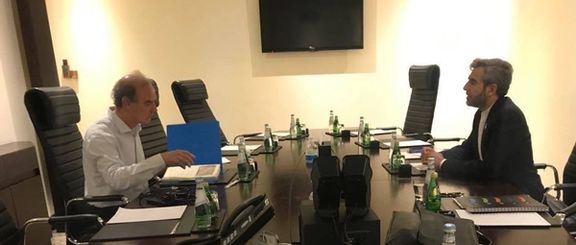
Reuters news agency last week cited an Iranian and European official that Tehran had signaled it might drop a demand for its Revolutionary Guards to be removed from the US list of ‘foreign terrorist organizations.’ There have for weeks been suggestions from analysts that the issue, which is contentious in both Tehran and Washington, could be kicked into the long grass.
Borrell, in a trip to Tehran accompanied by Mora, announced at the weekend a new phase in talks, which had up to mid-March been based in Vienna and involved the remaining JCPOA signatories – China, France, Germany, Iran, Russia, and the United Kingdom – with the US, which left the agreement in 2018, taking part indirectly through a team in a separate hotel.
Iran has apparently refused face-to-face talks with the Americans, both within JCPOA structures and the kind of informal contracts that led up to the JCPOA in 2015. Qatar – which has good relations with both Tehran and Washington, and is relatively distanced from JCPOA-opponent Saudi Arabia – has played a quiet role mediating between the two sides.
Mora and Borrell have both expressed guarded optimism over prospects while suggesting substantive issues remained. Mora last week tweeted a picture of himself, Borrell and Malley at dinner, over which the US envoy expressed what Mora called “firm US commitment to come back to the deal.”
In Tehran Mohammad Ali Abtahi, a vice-president under reformist president Mohammad Khatami (1997-2005), tweeted that “opportunities can go as quickly as passing clouds.”